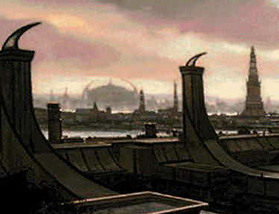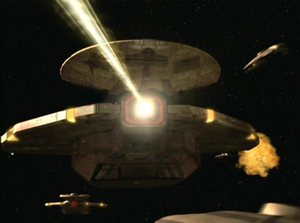Cardassian Union
More actions
The Cardassian Union, sometimes referred to as the Cardassian Empire, has a long, rich history. The Cardassians were originally an empire driven by peaceful and spiritual knowledge. When an extreme resource depression forced the Cardassian people into a more militaristic power the tides of political power changed on Cardassia Prime in an effort to gather off world resources in the name of self preservation. Since that time the Cardassians have striven to expand in an effort to increase their storage of raw materials and economic wealth.
The head of the Cardassian Union is Chairman Ila Rekal.
History
The history of the Cardassian Union tends to consist of extremes, once a peaceful and spiritual people, their planets poor resources proved unable to support their expanding population and starvation and disease became rampant. Millions of deaths resulted, leading to a general breakdown in the government. The military forces of the planet staged a takeover and launched several wars against their neighbors in order to secure new resources. Although further millions were lost in these wars, the military government did succeed in stabilizing the situation on Cardassia. The Cardassian Union itself was formed under an agreement between Central Command and the Obsidian Order to share power.

In 2346 the Cardassians invaded Setlik III, believing it to be a base to be used in an invasion of their own territory by the United Federation of Planets and a prolonged period of tension further heightened by hostilities resulted. In 2355 the Federation dispatched a Constellation Class starship in an attempt to make peace, but the Cardassians rejected the offer and forced the ship to flee. Hostilities officially ended in 2367, although the Cardassians remained less than friendly.
Dominion War
In 2372 a civilian uprising deposed the military government. Suspecting Dominion involvement in the coup, the Klingons launched an invasion of Cardassian space and eventually Cardassia Prime, the Cardassian homeworld. The Federation opposed this action and was successful in forcing the Klingons to halt their advance towards Cardassia Prime. Although this destroyed the Federation-Klingon alliance and resulted in a short period of hostilities between those two powers after the Klingon Empire withdrew from the Khitomer Accords. The Federation shipped considerable aid to the devastated Cardassian government.
Humiliated by having to rely on charity from a former enemy after a relatively quick and easy defeat at the hands of the Klingon Empire, Gul Dukat led a Dominion takeover of the Cardassian Union and was installed as ruler of the region in 2373 and promoted to legate. The Dominion were quick to upgrade the Cardassian fleet and introduce more advanced technologies into their ship building techniques. Cardassian forces had subsequently fought along side the Jem'Hadar in the Dominion War with their leader, Legate Damar, who took power after Legate Dukat was presumed dead. However, on stardate 52412.8, that all changed; angered by the Dominion's alliance with the Breen and the loss of over 7 million troops, Damar led a Cardassian fleet comprised of elements of the 1st, 3rd, and 9th Orders. They attacked and destroyed the Dominion Cloning Facility on Rondak III. In doing so, Damar had called on all Cardassians to rebel against the Dominion. During the final battle for Cardassia Prime the Dominion seemed to have the Federation-Romulan-Klingon Alliance outnumbered. However once word of the Dominion destroying Lakarian City on Cardassia Prime reached the Cardassian troops that were within the Dominion fleet, all the Cardassian vessels turned on the Dominion and Breen vessels. The Alliance wasted no time in joining the Cardassians and thus the Dominion War ended with a Alliance victory.
The United Federation of Planets extended a hand of friendship to the Union after the war in an effort to help them rebuild. While the Union was loath to accept that help there was little choice: the Cardassian Union had be devastated by the war and barely had the resources to rebuild Cardassia Prime, much less the rest of the Union. Three months after the end of the war, the first Federation assistance arrived on Cardassia Prime.
Recovery

Post-Dominion War Cardassia, and the Union as a whole, is a ghost of its former glory. With their infrastructure obliterated by the occupation by Dominion forces, their people left starving and without the means to support themselves, the Detapa Council turned to their ‘liberators’, namely the Federation and their allies, for aid and relief following the end of the war. Such aid is rendered, though not without conditions; namely that the Cardassian people forget any ambitions of extending their grasp to worlds under Federation protection, including but not limited to Bajor. Given their desperation to have their worlds returned to self-sufficiency, it wasn’t a hard bargain to strike. This led to a cold war of sorts, with the Cardassian government allowing Federation backed trade vessels into their space while turning their expansionist eyes toward the other side of the Alpha Quadrant rather than toward Federation space.
This tacite peace lasted right up until the events of Utopia Planetia attack in 2385, when the policies of the Federation suddenly shifted to matters of the internal state rather than those of external relations with other governments. Just as the Romulans found themselves abandoned when the Federation gave up on the rescue fleet, so too did the Cardassians find themselves suddenly abandoned by their ‘benefactors’. This begins the Detapa Council’s slow decline in power.
A Turbulent Decade
In the first few years after the Federation aid petered out, the Council was able to find means and methods to gloss over the loss of goods that had been almost a staple for the various worlds as they continued to rebuild and refocus their efforts and energies on reaching the oft stated goal of complete self-reliance that the Union had enjoyed prior to the Dominion War. But these measures were only a temporary fix to a problem they had never wanted to admit, that being that they had grown dependent on Federation assistance, relying on them to provide for them the very things they had promised their people they would be able to provide for themselves.
The Central Command, throughout these early years, had been browbeaten and tossed to the side, a ‘relic of the past’ according to the Council. The old warmongering military officers were given little in the way of support and resources to rebuild their military might, a calculated move by the Detapa Council to limit their ability to threaten their lofty position as providers for the people. When resources elsewhere began to grow scarce, the Central Command took it as their cue that the Council had finally reached the limits of their grandiose promises and that the time was ripe for them to swoop in and take the power they’d been stripped of back.
Whether by deceit, machinations, or outright murder, the leaders of the Central Command began to build a foothold, inciting a great many worlds within the Union to begin demanding that the Council relinquish their hold on aspects of governance that they had previously held sole dominion over since the end of the war thanks to the Cardassian military being disgraced so thoroughly. By the early 2390s, both the Detapa Council and Central Command could be said to have had equal footing when it came to which of them held power in the Cardassian Union.
Return of the Obsidian Order
Not to be outdone, the Detapa Council decided that the Obsidian Order would help to break the stalemate that had begun to stieme the government. By the middle of the year in 2395, the Obsidian Order had infiltrated the ranks of the Central Command, their numbers soon large enough to control Cardassia Prime itself, and a large number of military installations in the surrounding space. Their insidious and effective infiltration put Central Command on the backfoot, sending the major players into a panic over how they would recover from the crippling loss of the home system.
With this newfound security, the Detapa Council decides that they are strong enough to reopen their relations with the Federation, a rather thinly veiled attempt to pull in much needed resources that had been lacking for nearly a decade at this point. Their overtures were met with mixed results, given that the Cardassians weren’t willing to give much up other than a promise to continue their non-aggressive policies toward Federation holdings in exchange for trade being reestablished. With some flow of goods finally returned to the Cardassian economy, the Council believes itself finally to be in a position to bring Central Command to heel once and for all.
Central Command Retaliates
It doesn’t take long before the Central Command becomes desperate enough to act. They begin organizing raids on the trade vessels, at first little more than pirate style raids in stolen vessels untraceable to the Cardassian Union. When these raids are met with very little in the way of response from either side, the scale and breadth for which they reach grows far more ambitious and bold. By 2398, Cardassian ships were leading massive raids on transport convoys, resulting in a great many lives lost in the endeavor. This garners the attention Central Command had been hoping for.
The Federation cut off all trade with the Cardassian Union, blaming the Detapa Council for orchestrating the savage brutality that their convoys endured. The Council immediately denies involvement in the raids, going so far as to point to their own military leaders as the culprits of said raids. This impassioned denial falls on deaf ears, and the Federation revokes the trade agreement they made with the Council, and ostensibly cut the Union off from all but the most unscrupulous and untrustworthy smugglers.
Having been robbed of their support, and in turn being substantially weakened by the action of Central Command, the Detapa Council orders the Obsidian Order to begin hunting down those responsible for the raids.
Structure of the Union
Detapa Council
The Detapa Council, headed by the Chairman, the Cardassian Head of State, is the civilian governing body on Cardassia Prime that is tasked with all the civilian power of the Union. The Detapa Council represents the Cardassian people and their wishes. As elected officials they claim to coordinate efforts with the legate's of the Central Command, but in reality the Central Command usually ignored the wishes of the Council.
While both organizations are supposed to be equally as powerful through the checks and balances system, in effect the Detapa Council holds all the political legislative, executive and, judicial power on Cardassia. However as they are not the military force and are only an elected civilian body and have no control of the military.
Central Command
The Central Command is the main military operating force of the Cardassian Union. Operating thousands of vessels across Cardassian space the Central Command is tasked with, but not limited to, overseeing the protection of the Cardassian people, the security of it's boarders, national security of the Cardassian Union, exploration of unknown space, first contact with new races and civilizations, shipping and handling of cargo within the Cardassian Union, and protection of civilian freighters within Cardassian civilian owned companies.
Ministry of Justice
The Ministry of Justice is the central legal structure of the Cardassian Union dealing with the courts and judicial system. Considered cruel by most standards, Cardassians have a unique sense of justice. Often the verdict and punishments of criminals are arranged far in advance of any trial. Because of this, trials, usually publicly broadcasted, are just propaganda for the Cardassian government. While the Union underwent somewhat of a cultural revolution after the war, the sense of justice the Cardassian people is unchanged and a point of national pride. The Detapa Council keeps an iron grip on the Ministry to keep the Cardassian method of justice unchanged.
Cardassians In Play
Cardassians are xenophobic by nature, but this does not mean that they will not exploit opportunities when they present themselves. Given their long, antagonistic history with neighboring powers, most Cardassians will be cautious, skeptical, and deceitful in their dealings with the wider galactic population.
Currently, there are two factions in the Cardassian Union vying for dominance. The Cardassian Central Command is composed of the militarist Legates and their subordinates, and encounters with this group are generally highlighted with threats and occasionally with violence if they believe it will benefit their agenda. The Detapa Council is composed of more moderate individuals who are attempting to reestablish relations with the Federation and other similar governments in order to bolster their economic and diplomatic power. Encounters with this faction will seldom, if ever, lead to violent confrontations, depending more on cunning manipulation of dealings toward a positive Cardassian outcome.
Technologically, Cardassians have not lagged behind the Federation in any significant way. Their vessels still pose a credible threat to those who encounter them in a hostile situation. Central Command usually dispatches multiple vessels of various types when executing operations, which makes them exceedingly dangerous for lone Federation vessels. While the Detapa Council, through the infiltration of the Obsidian Order, maintains a sizable fleet of vessels and stations of their own, these ships are generally dispatched alone and will generally attempt peaceful negotiations rather than violence as a first resort.
Encounters with Cardassian vessels directly along the Federation border are incredibly rare, as the Detapa Council is currently endeavoring to entice negotiations with other powers to solidify their power base. On the far side of the Union, however, expansionist policies enacted by the Central Command faction to gain resources and territory provide for ample opportunity for vessels to encounter Cardassian ships. In these areas, vessels can expect to be met with probing assaults, and should the attacks prove a vessel to be sufficiently weak, a followup assault by a larger force should be expected.
With the current storylines in place, interactions with Cardassian vessels can flow in either direction since the internal politics of the Cardassian Union are not a matter of public knowledge. Should a story be more advantageous for the crew to have a hostile encounter, it can later be blamed on the machinations of the Central Command faction. If a more peaceful approach is preferred, later dealings and encounters with the same ship/group of ships can easily be credited to the Detapa Council and their own designs for political gain. The encounters need not restrict themselves to any one area for the time being, though this may/will change as story elements are solidified and boundaries for each faction are made less ambiguous. Template:Cardassian Footer
